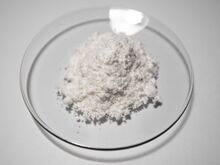Chemistry:TCPO

| |
 Sample of pure compound
| |
| Names | |
|---|---|
| Preferred IUPAC name
Bis(2,4,6-trichlorophenyl) oxalate | |
| Other names
Bis(2,4,6-trichlorophenyl) ethanedioate; Oxalic acid, bis(2,4,6-trichlorophenyl) ester
| |
| Identifiers | |
3D model (JSmol)
|
|
| ChemSpider | |
PubChem CID
|
|
| |
| |
| Properties | |
| C14H4Cl6O4 | |
| Molar mass | 448.88 g·mol−1 |
| Appearance | White crystalline powder |
| Density | 1.698 g/cm3 |
| Melting point | 188 to 192 °C (370 to 378 °F; 461 to 465 K) |
| Boiling point | 500.9 °C (933.6 °F; 774.0 K) |
| 0.01962 mg/L | |
| Hazards | |
| Flash point | 190.6 °C (375.1 °F; 463.8 K) |
Except where otherwise noted, data are given for materials in their standard state (at 25 °C [77 °F], 100 kPa). | |
| Infobox references | |
TCPO, or bis(2,4,6-trichlorophenyl) oxalate, is a chemical used in some types of glow sticks.
Uses
When combined with a fluorescent dye like 9,10-bis(phenylethynyl)anthracene, a solvent (such as diethyl phthalate), and a weak base (usually sodium acetate or sodium salicylate), and hydrogen peroxide, the mixture will start a chemiluminescent reaction to glow a fluorescent green color.[1]
Red, yellow and blue colors can be made by replacing the 9,10-bis(phenylethynyl)anthracene with rhodamine B, rubrene and 9,10-diphenylanthracene respectively.
The above Fluorescent dyes absorb much of the energy produced during the decomposition of the oxalate ester, and convert that energy into light energy which is observed as the characteristic glow in products such as glowsticks.
Preparation
TCPO can be prepared from a solution of 2,4,6-trichlorophenol in a solution of dry toluene by reaction with oxalyl chloride in the presence of a base such as triethylamine. This method produces crude TCPO with a by-product of triethylamine hydrochloride. The triethylamine hydrochloride can be dissolved in water, methanol or ethanol, so the product is more purified. After washing it can be recrystallized from ethyl acetate.
See also
- Bis(2,4,5-trichlorophenyl-6-carbopentoxyphenyl)oxalate (CPPO)
- MCPO
References
- ↑ Mohan, Arthur G.; Turro, Nicholas J. (August 1974). "A Facile and Effective Chemiluminescence Demonstration Experiment". Journal of Chemical Education 51 (8): 528. doi:10.1021/ed051p528.
 |
